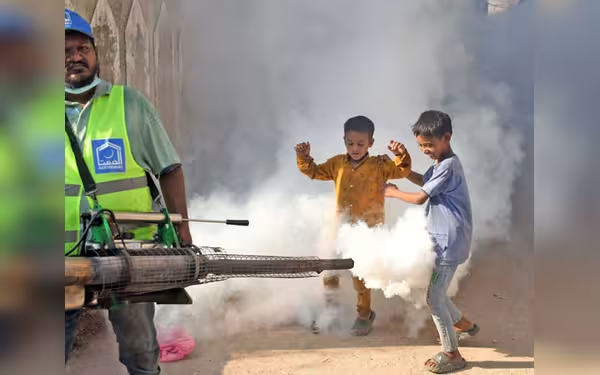Saturday, November 16, 2024 09:45 PM
Punjab Reports 141 New Dengue Cases, Urgent Action Required
- 141 new dengue cases confirmed in Punjab.
- Rawalpindi reports the highest number of infections.
- Health Department urges public cooperation for prevention.
 Image Credits: dailytimes_pk
Image Credits: dailytimes_pkPunjab Health Department confirms 141 new dengue cases, urging public cooperation and preventive measures to combat the outbreak.
The ongoing battle against dengue fever in Punjab has taken a concerning turn as the Health Department confirmed 141 new cases on Saturday. This alarming rise in infections highlights the urgent need for public awareness and preventive measures. Dengue, a mosquito-borne viral infection, poses significant health risks, particularly in densely populated areas. The recent surge brings the total number of reported cases in the province to 2,389 for the year 2024, with Rawalpindi being the hardest hit, accounting for 129 of the new cases.
In addition to Rawalpindi, other districts such as Lahore, Jehlum, and Mianwali each reported three cases, while Attock, Bahawalpur, and Sahiwal recorded single cases. The situation has prompted the Punjab Health Department to reassure the public that all necessary measures are in place to manage the outbreak effectively. Government hospitals are reportedly well-stocked with medicines and treatments for dengue patients, ensuring that those affected receive the care they need.
To combat the spread of the virus, the Health Department has issued an advisory urging citizens to maintain clean and dry surroundings. This is crucial, as stagnant water is a breeding ground for the mosquitoes that transmit dengue. Public cooperation is deemed essential, as health teams are actively working across the province to control the situation. The provincial government is taking this matter seriously, with Provincial Health Minister Khawaja Salman Rafique emphasizing the need for a full-scale response to the dengue outbreak.
During an anti-dengue meeting held at the deputy commissioner’s office, the minister called for zero tolerance towards any negligence by health officials. He stated that controlling dengue is the government's top priority and directed relevant departments to perform their duties diligently. The minister highlighted the importance of immediate action, stating, "Case response should be immediately covered by IRS spraying and fogging." This proactive approach aims to reduce the mosquito population and prevent further infections.
Moreover, the minister urged surveillance teams to educate the public about preventive measures. Awareness campaigns are vital in informing citizens about how to protect themselves and their families from dengue. Dr. Waseem Akram, a focal person for dengue, emphasized the need for a clean sweep in high-risk union councils, indicating that targeted efforts are necessary to curb the outbreak.
As the situation unfolds, it is clear that community involvement and awareness are key to controlling the dengue outbreak in Punjab. Citizens are encouraged to take personal responsibility by ensuring their surroundings are free of stagnant water and by staying informed about preventive measures. The fight against dengue is not just the responsibility of health officials; it requires a collective effort from everyone. By working together, we can help protect our communities and reduce the impact of this disease.













